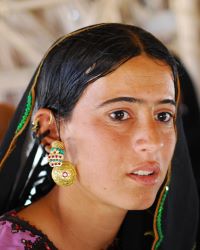Baloch, Southern in Iran

Photo Source:
Nasha Ila - Flickr
Creative Commons
|
Send Joshua Project a map of this people group.
|
| People Name: | Baloch, Southern |
| Country: | Iran |
| 10/40 Window: | Yes |
| Population: | 607,000 |
| World Population: | 1,794,000 |
| Primary Language: | Balochi, Southern |
| Primary Religion: | Islam |
| Christian Adherents: | 0.00 % |
| Evangelicals: | 0.00 % |
| Scripture: | New Testament |
| Ministry Resources: | Yes |
| Jesus Film: | Yes |
| Audio Recordings: | Yes |
| People Cluster: | Baloch |
| Affinity Bloc: | South Asian Peoples |
| Progress Level: |
|
Introduction / History
The Southern Baloch of Iran are part of a much larger Baloch community numbering several million. Their homeland straddles the borders of Iran and Pakistan, with a majority living in Pakistan. About half of those in Iran live in cities, while the others are semi-nomadic shepherds. The various Baloch groups speak different languages, each with distinguishing characteristics. These languages have been divided into three groups: Eastern, Western, and Southern Balochi.
Their name, "Baloch," is shrouded in controversy. Some say it means "nomad," while others claim that it is an old Persian word meaning "the cock's crest." Their history is just as mysterious. Some have traced their origins to Nimrod, son of Cush (Noah's grandson). But while some things are uncertain, we do know that they first moved to the region in the twelfth century. During the Moghul period, this territory became known as "Balochistan."
What Are Their Lives Like?
Balochmayar is the honor code by which the Baloch live. These principles include extending hospitality and mercy, dealing with each other honestly, and offering refuge to strangers. They are preserved through both songs and poetry. Children learn proper behavior by watching their elders and are taunted whenever they misbehave.
The traditional Southern Baloch economy is based on a combination of farming and semi-nomadic shepherding. They usually raise sheep, cattle, or goats. Agriculture is limited because of the harsh climate; nevertheless, it plays a large role in the economy. Their chief crop is wheat. While their survival techniques may vary, each community tries to keep a wide variety of animals and grow many different crops. If the local economy does not provide adequate job opportunities, the young men often move to the cities in search of work.
One wild plant, called the dwarf palm, is used as a dietary supplement. They eat the meat of the palm and use the leaves to make ropes, shoes, mats and tents.
Southern Baloch societies are organized into kin-based clans and territorially defined tribes. Male elders are the heads of these tribal units. Village settlements are clusters of mud houses, loosely organized around the home of the local chief. They live in these permanent settlements in the summertime. However, in winter, they migrate to the plains and coastal areas, seeking green grass for their livestock. During this time, they live in tents, and move freely across the landscape as the weather dictates. These temporary settlements are smaller.
The entire household is responsible for tending the family's herds. Women work in groups, threshing and separating the harvest, while plowing and planting are done by the men. Traditionally, land is not privately owned but belongs to the whole tribe.
What Are Their Beliefs?
Prior to the coming of Islam, the Southern Baloch were probably Zoroastrians. Today, they are Sunni Muslims. All forms of secular authority are separated from the spiritual authority held by religious leaders.
What Are Their Needs?
The Southern Baloch have been isolated for many years due to Iran's harsh climate, the difficulty of communicating in mountainous terrain, and their former reputation as bandits. The governments of Iran, Afghanistan, and Pakistan have built roads. However, the Southern Baloch have remained largely unaffected by these developmental changes.
Prayer Points
Ask the Lord to call many to share Christ with the Southern Baloch.
Ask God to open doors for Christian businessmen, teachers, and other tentmakers to share the gospel with them.
Ask the Holy Spirit to soften the hearts of the Southern Baloch towards Christians so that they will be receptive to the gospel.
Pray that God will open the hearts of Iranian governmental leaders to the gospel.
Ask the Lord to raise up a strong local church among the Southern Baloch.